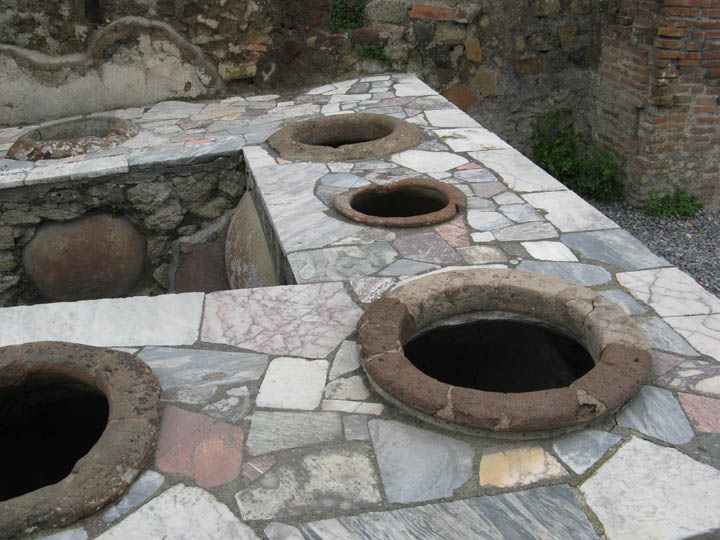A Roman tavern in Herculaneum
For the Autumn of Perseus, which is going on over on the Ancient Warfare blog (just in case you missed it!), I was searching through my photos to find a picture of a fresco of Perseus’ rescue of Andromeda. I also stumbled across the pictures I took back in 2013 in Herculaneum, including photos taken of the local thermopolium (no. 38 in the audio tour, for those who care!).
Thermopolium, the Latinized version of Greek thermopolion, is literally a place where hot drinks are sold, and can also be translated simply as a ‘cook-shop’ (as per the LSJ). These places can be regarded simply as cafés or taverns (and are indeed sometimes referred to as tabernae among modern commentators). They were shops where one could get drinks and, in a few at least, some kind of (warm) meal.
Here’s a photo of the entrance from the street to the thermopolium in Herculaneum:

And this is a close up of the counter. Jars (dolia) were sunk into the counter and this is where food and drink was stored, ready to be served up to the customer:

Poor people who lived in the city, such as those who resided in insulae (apartments), tended not to have access to a kitchen of their own and thus relied on thermopolia to purchase their warm meals. Aside from Herculaneum, a number of these establishments have also been found in Pompeii, but they were common throughout the Greek and Roman world. The Greeks referred to such places as kapeleia (singular, kapeleion), and they were used from at least the fifth century BC onwards (see, for example, Isocrates, Antidosis 286–287).
Indeed, taverns like this may well pre-date the Classical period. In their book Ancient Inventions (about which I’ve written before), Peter James and Nick Thorpe point out that a possible snack bar was unearthed at Troy, in a level dated to the thirteenth century BC, just inside the southern gateway. As they put it, “Perhaps we should imagine Hector stopping by the gateway to grab some pita bread on his way to do battle with Achilles” (p. 313).
By the Classical era, at least, these establishments didn’t enjoy a good reputation and were regarded as places where men got drunk, gambled, and visited prostitutes. Plautus, the Roman playwright, mentions thermopolia in his comedy Curculio (ll. 285–295) as places where those silly Greeks hung out:
And then those Grecians with their cloaks, who walk about with covered heads, who go loaded beneath their cloaks with books, and with baskets, they loiter together, and engage in gossiping among themselves, the gad-abouts; you may always see them enjoying themselves in the hot liquor-shops (thermopolia).
According to Cassius Dio, the Emperor Claudius ordered in AD 41 that such places be closed down altogether (60.6.7), probably because they were regarded as places where discontents gathered to perhaps foment some kind of rebellion. Yet, despite the criticisms, these taverns were popular and continued to exist and flourish throughout the ancient world.




